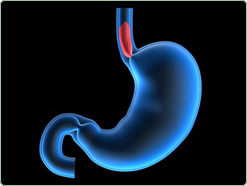What is Gastroesophageal Reflux (GERD)?

GERD, also referred to as acid reflux or heartburn, occurs when the stomach contents (generally acid) flows up into the esophagus. The irritation caused by the acid is perceived as a burning sensation or heart burn. Acid reflux may also present as nausea, cough, unexplained chest pain, sore throat or changes in voice. Persistent reflux may be a sign of a more serious condition and should be evaluated by a gastroenterologist.
What Causes Reflux?
A muscular barrier called the Lower Esophageal Sphincter (LES) keeps the contents of the stomach from flowing back into the esophagus. Acid Reflux occurs when the muscular barrier between the stomach and esophagus weakens allowing acid to flow into the esophagus. This weakness usually occurs due to the presence of a hiatal hernia, where part of the stomach herniates into the chest. Also, the LES relaxes when food passes down into the stomach or when we burp. Certain foods such as coffee, mint and chocolate relax the LES and increase reflux. Carbonated drinks or a large meal also cause the LES to relax for air to escape and therefore cause reflux and heartburn.
How is Acid Reflux Diagnosed?
Acid reflux is usually a clinical diagnosis. Sometimes the only symptoms of acid reflux are nausea, cough phlegm production or unexplained chest pain. When reflux presents with unusual symptoms further evaluation may be done by an upper endoscopy to diagnose reflux and to ensure no other problems such as esophagitis (inflammation of the esophagus), ulcers or cancer exist. During endoscopy you doctor can see the lining of the esophagus and detect any damage due to acid reflux.
What are the consequences of having Acid reflux?
Heartburn is a telling you that acid is burning the lining of the esophagus and causing damage. The esophagus can become inflamed and develop ulcers. When esophagus is damaged repeatedly, it can scar and develop a narrowing called esophageal stricture. A stricture can lead to difficulty swallowing or food getting stuck. Also, long-term acid reflux or heartburn increases the risk of esophageal cancer. Untreated acid reflux can lead to a condition called Barrett’s esophagus where the lining of the esophagus changes. Barrett’s esophagus can be the first step in development of esophagus cancer.
When Should I See a Gastroenterologist for my Heartburn?
You should see a gastroenterologist if your symptoms continue after making simple lifestyle and diet changes. If you have symptoms of heartburn or acid regurgitation and use over-the-counter medications regularly, you should see a gastroenterologist to determine the best course of treatment for you. If you have persistent heartburn, an upper endoscopy can determine if you have any damage to the lining of your esophagus. Finally, you should see a gastroenterologist immediately if you have symptoms such as unexplained weight loss, trouble swallowing, or bleeding alone or in addition to heartburn and/or acid regurgitation.
